- Home
- David Eddings
Queen of Sorcery
Queen of Sorcery Read online
About the Book
The Accursed One is not dead…
He only sleeps…
The evil God Torak covets dominion over all men. If the stolen Orb of Aldur reaches him, he will surely gain what he desires.
Garion travels through strange lands with master sorcerers Belgarath and Polgara in frantic pursuit of the Orb. But as his own powers grow, Garion starts to realize that he too may have a part to play – a part he is not sure he wants…
Contents
Cover
About the Book
Title page
Dedication
Prologue
Map
Part One: Arendia Chapter One
Chapter Two
Chapter Three
Chapter Four
Chapter Five
Chapter Six
Chapter Seven
Chapter Eight
Chapter Nine
Chapter Ten
Chapter Eleven
Part Two: Tolnedra Chapter Twelve
Chapter Thirteen
Chapter Fourteen
Chapter Fifteen
Chapter Sixteen
Chapter Seventeen
Chapter Eighteen
Chapter Nineteen
Chapter Twenty
Chapter Twenty-One
Chapter Twenty-Two
Part Three: Nyissa Chapter Twenty-Three
Chapter Twenty-Four
Chapter Twenty-Five
Chapter Twenty-Six
Chapter Twenty-Seven
Chapter Twenty-Eight
Chapter Twenty-Nine
Chapter Thirty
About the Author
Also by David Eddings
DAVID
EDDINGS
Book Two of The Belgariad
QUEEN OF
SORCERY
For Helen,
who gave me the most precious thing in my life,
and for Mike,
who taught me how to play.
Prologue
Being an Account of the Battle of the Kingdoms of the West against the most heinous Invasion and Evil of Kal Torak.
-based upon The Battle of Vo Mimbre
In the youth of the world, the evil God Torak stole the Orb of Aldur and fled, seeking dominion. The Orb resisted, and its fire maimed him with a dreadful burning. But he would not give it up, for it was precious to him.
Then Belgarath, a sorcerer and disciple of the God Aldur, led forth the king of the Alorns and his three sons, and they reclaimed the Orb from the iron tower of Torak. Torak sought to pursue, but the wrath of the Orb repelled him and drove him back.
Belgarath set Cherek and his sons to be kings over four great kingdoms in eternal guard against Torak. The Orb he gave to Riva to keep, saying that so long as a descendant of Riva held the Orb the West would be safe.
Century followed century with no menace from Torak, until the spring of 4865, when Drasnia was invaded by a vast horde of Nadraks, Thulls, and Murgos. In the center of this sea of Angaraks was borne the huge iron pavilion of one called Kal Torak, which means King and God. Cities and villages were razed and burned, for Kal Torak came to destroy, not to conquer. Those of the people who lived were given to the steel-masked Grolim priests for sacrifice in the unspeakable rites of the Angaraks. None survived save those who fled to Algaria or were taken from the mouth of the Aldur River by Cherek warships.
Next the horde struck south at Algaria. But there they found no cities. The nomadic Algarian horsemen fell back before them, then struck in vicious hit-and-run attacks. The traditional seat of the Algarian kings was the Stronghold, a man-made mountain with stone walls thirty feet thick. Against this, the Angaraks hurled themselves in vain before settling down to besiege the place. The siege lasted for eight futile years.
This gave the West time to mobilize and prepare. The generals gathered at the Imperial War College in Tol Honeth and planned their strategy. National differences were set aside, and Brand, the Warder of Riva, was chosen to have full command. With him came two strange advisers: an ancient but vigorous man who claimed knowledge even of the Angarak kingdoms; and a strikingly handsome woman with a silver lock at her brow and an imperious manner. To these Brand listened, and to them he paid almost deferential respect.
In the late spring of 4875, Kal Torak abandoned his siege and turned west toward the sea, pursued still by Algar horsemen. In the mountains, the Ulgos came forth from their caverns by night and wreaked fearful slaughter on the sleeping Angaraks. But still were the forces of Kal Torak beyond counting. After a pause to regroup, the host proceeded down the valley of the River Arend toward the city of Vo Mimbre, destroying all in its path. Early in the summer, the Angaraks deployed for the assault upon the city.
On the third day of the battle, a horn was heard to blow three times. Then the gates of Vo Mimbre opened, and the Mimbrate knights charged out to fall upon the front of the Angarak horde, the iron-shod hoofs of their chargers trampling living and dead. From the left came Algar cavalry, Drasnian pikemen, and veiled Ulgo irregulars. And from the right came the Cherek berserks and the legions of Tolnedra.
Attacked on three sides, Kal Torak committed his reserves. It was then that the gray-clad Rivans, the Sendars, and the Asturian archers came upon his forces from the rear. The Angaraks began to fall like mown wheat and were overcome by confusion.
Then the Apostate, Zedar the Sorcerer, went in haste to the black iron pavilion from which Kal Torak had not yet emerged. And to the Accursed One he said, "Lord, throe enemies have thee surrounded in great numbers. Yea, even the gray Rivans have come in their numbers to cast defiance at thy might."
Kal Torak arose in anger and declared, "I will come forth, that the false keepers of Cthrag Yaska, the jewel which was mine, shall see me and know fear of me. Send to me my kings."
"Great Lord," Zedar told him, "thy kings are no more. The battle hath claimed their lives and those of a multitude of thy Grolim priests as well."
Kal Torak's wrath grew great at these words, and fire spat from his right eye and from the eye that was not. He ordered his servants to bind his shield to the arm on which he had no hand and he took up his dread black sword. With this, he went forth to do battle.
Then came a voice from the midst of the Rivans, saying, "In the name of Belar I defy thee, Torak. In the name of Aldur I cast my despite in thy teeth. Let the bloodshed be abated, and I will meet thee to decide the battle. I am Brand, Warder of Riva. Meet me or take the stinking host away and come no more against the kingdoms of the West."
Kal Torak strode apart from the host and cried, "Where is he who dares pit his mortal flesh against the King of the World? Behold, I am Torak, King of Kings and Lord of Lords. I will destroy this loud-voiced Rivan. Mine enemies shall perish, and Cthrag Yaska shall again be mine."
Brand stood forth. He bore a mighty sword and a shield muffled with cloth. A grizzled wolf marched at his side, and a snowy owl hovered over his head. Brand said, "I am Brand and I will contend with thee, foul and misshapen Torak."
When Torak saw the wolf, he said, "Begone, Belgarath. Flee if thou wouldst save thy life." And to the owl he said, "Abjure thy father, Polgara, and worship me. I will wed thee and make thee Queen of the World."
But the wolf howled defiance, and the owl screeched her scorn. Torak raised his sword and smote down upon the shield of Brand. Long they fought, and many and grievous were the blows they struck. Those who stood near to see them were amazed. The fury of Torak grew great, and his sword battered the shield of Brand until the Warder fell back before the onslaught of the Accursed One. Then the wolf howled and the owl shrieked in one voice together, and the strength of Brand was renewed.
With a single motion, the Rivan Warder unveiled his shield, in th
e center of which stood a round jewel, in size like the heart of a child. As Torak gazed upon it, the stone began to glow and flame. The Accursed One drew back from it. He dropped his shield and sword and raised his arms before his face to ward away the dread fire of the stone.
Brand struck, and his sword pierced Torak's visor to strike into the eye that was not and plunge into the Accursed One's head. Torak fell back and gave a great cry. He plucked out the sword and threw off his helmet. Those who watched recoiled in terror, for his face was seared by some great fire and was horrible to behold. Weeping blood, Torak cried out again as he beheld the jewel which he had named Cthrag Yaska and for which he had brought his war into the West. Then he collapsed, and the earth resounded with his fall.
A great cry went up from the host of the Angaraks when they saw what had befallen Kal Torak, and they sought to flee in their panic. But the armies of the West pursued them and slew them, so that when the smoky dawn broke on the fourth day, the host was no more.
Brand asked that the body of the Accursed One be brought to him, that he might behold him who would be king of all the world. But the body was not to be found. In the night, Zedar the Sorcerer had cast an enchantment and passed unseen through the armies of the West, bearing away the one he had chosen as master.
Then Brand took counsel with his advisers. And Belgarath said to him, "Torak is not dead. He only sleeps. For he is a God and cannot be slain by any mortal weapon."
"When will he awaken?" Brand asked. "I must prepare the West against his return."
Polgara answered, "When once again a King of Riva's line sits on his northern throne, the Dark God will waken to do war with him."
Brand frowned, saying, "But that is neverl" For all knew that the last Rivan King had been slain with his family in 4002 by Nyissan assassins.
Again the woman spoke. "In the fullness of time the Rivan King will rise to claim his own, as the ancient Prophecy foretells. More cannot be said."
Brand was content and set his armies to cleaning the battlefield of the wreckage of Angaraks. And when that was finished, the kings of the West gathered before the city of Vo Mimbre and held council. Many were the voices raised in praise of Brand.
Soon men began crying that Brand should henceforth be chosen as ruler of all the West. Only Mergon, ambassador of Imperial Tolnedra, protested in the name of his Emperor, Ran Borune IV. Brand refused the honor, and the proposal was dropped, so that there was again peace among those assembled in council. But in return for peace, a demand was made of Tolnedra.
The Gorim of the Ulgos spoke first in a loud voice. "In fulfillment of the Prophecy, there must be promised a princess of Tolnedra to be wife unto the Rivan King who will come to save the world. This the Gods require of us."
Again Mergon protested. "The Hall of the Rivan King is empty and desolate. No king sits upon the Rivan throne. How many a princess of Imperial Tolnedra be wed with a phantom?"
Then the woman who was Polgara replied. "The Rivan King will return to assume his throne and claim his bride. From this day forward, therefore, each princess of Imperial Tolnedra shall present herself in the Hall of the Rivan King upon her sixteenth birthday. She shall be clad in her wedding gown and shall abide there for three days against the coming of the King. If he comes not to claim her, then she shall be free to return to her father for whatever he may decree for her."
Mergon cried out. "All Tolnedra shall rise against this indignity. No! It shall not be!"
The wise Gorim of the Ulgos spoke again. "Tell your Emperor that this is the will of the Gods. Tell him also that in the day Tolnedra fails in this, the West shall rise against him and scatter the sons of Nedra to the winds and pull down the might of the Empire, until Imperial Tolnedra is no more."
At that, seeing the might of the armies before him, the ambassador submitted to the matter. All then agreed and were bound to it.
When that was done, the nobles of strife-torn Arendia came to Brand, saying, "The king of the Mimbrates is dead and the duke of the Asturians also. Who now shall rule us? For two thousand years has war between Mimbre and Asturia rent fair Arendia. How may we become one people again?"
Brand considered. "Who is heir to the Mimbrate throne?"
"Korodullin is crown prince of the Mimbrates," the nobles replied.
"And to whom descends the Asturian line?"
"Mayaserana is the daughter of the Asturian duke," they told him.
Brand said, "Bring them to me." And when they were brought before Brand, he said to them, "The bloodshed between Mimbre and Asturia must end. Therefore, it is my will that you be wed to each other and that the houses which so long have warred shall thus be joined."
The two cried against the judgment, for they were filled with ancient enmity and with the pride of their separate lines. But Belgarath took Korodullin aside and spoke in private with him. And Polgara withdrew Mayaserana to a separate place and was long in converse with her. No man learned then or later what was said to the two young people. But when they returned to where Brand waited, Mayaserana and Korodullin were content that they should be wed. And this was the final act of the council that met after the battle of Vo Mimbre.
Brand spoke to all the kings and nobles one final time before departing for the north.
"Much has been wrought here that is good and shall endure. Behold, we have met together against the Angaraks and they have been overthrown. Evil Torak is quelled. And the covenant we have made here among us prepares the West for the day of the Prophecy when the Rivan King shall return and Torak shall wake from his long sleep to contend again for empire and dominion. All that may be done in this day to prepare for the great and final war has been done. We can do no more. And here, perchance, the wounds of Arendia have been healed, and the strife of more than two thousand years may see its end. So far as may be, I am content with it all.
"Hail, then, and farewell!"
He turned from them and rode north with the grizzled man who was Belgarath and the queenly woman who was Polgara by his side. They took ship at Camaar in Sendaria and set sail for Riva. And Brand returned no more to the kingdoms of the West.
But of his companions are many tales told. And of that telling, what may be true and what false few men may know.
Chapter One
Vo Wacune was no more. Twenty-four centuries had passed since the city of the Wacite Arends had been laid waste, and the dark, endless forests of northern Arendia had reclaimed the ruins. Broken walls had toppled and been swallowed up in the moss and wet brown bracken of the forest floor, and only the shattered stumps of the once proud towers moldered among the trees and fog to mark the place where Vo Wacune had stood. Sodden snow blanketed the mist-shrouded ruins, and trickles of water ran down the faces of ancient stones like tears.
Garion wandered alone down the tree-choked avenues of the dead city, his stout gray wool cloak drawn tight against the chill, and his thoughts as mournful as the weeping stones around him. Faldor's farm with its green, sun-drenched fields was so far behind him that it seemed lost in a kind of receding haze, and he was desperately homesick. No matter how hard he tried to hold onto them, details kept escaping him. The rich smells of Aunt Pol's kitchen were only a faint memory; the ring of Durnik's hammer in the smithy faded like the dying echo of the last note of a bell, and the sharp, clear faces of his playmates wavered in his remembrance of them until he could no longer be sure that he would even recognize them. His childhood was slipping away, and try though he might he could not hold on to it.
Everything was changing; that was the whole problem. The core of his life, the rock upon which his childhood had been built, had always been Aunt Pol. In the simple world of Faldor's farm she had been Mistress Pol, the cook, but in the world beyond Faldor's gate she was Polgara the Sorceress, who had watched the passage of four millennia with a purpose beyond mortal comprehension.
And Mister Wolf, the old vagabond storyteller, had also changed. Garion knew now that this old friend was in fact his great-great grand
father - with an infinite number of additional "greats" added on for good measure - but that behind that roguish old face there had always been the steady gaze of Belgarath the Sorcerer, who had watched and waited as he had looked upon the folly of men and Gods for seven thousand years. Garion sighed and trudged on through the fog.
Their very names were unsettling. Garion had never wanted to believe in sorcery or magic or witchcraft. Such things were unnatural, and they violated his notion of solid, sensible reality. But too many things had happened to allow him to hold on to his comfortable skepticism any longer. In a single, shattering instant the last vestiges of his doubt had been swept away. As he had watched with stunned disbelief, Aunt Pol had erased the milky stains from the eyes of Martje the witch with a gesture and a single word, restoring the madwoman's sight and removing her power to see into the future with a brutal evenhandedness. Garion shuddered at the memory of Martje's despairing wail. That cry somehow marked the point at which the world had become less solid, less sensible, and infinitely less safe.
Uprooted from the only place he had ever known, unsure of the identities of the two people closest to him, and with his whole conception of the difference between the possible and the impossible destroyed, Garion found himself committed to a strange pilgrimage. He had no idea what they were doing in this shattered city swallowed up in trees, and not the faintest idea where they would go when they left. The only certainty that remained to him was the single grim thought to which he now clung; somewhere in the world there was a man who had crept through the predawn darkness to a small house in a forgotten village and had murdered Garion's parents; if it took him the rest of his life, Garion was going to find that man, and when he found him, he was going to kill him. There was something strangely comforting in that one solid fact.

 The Losers
The Losers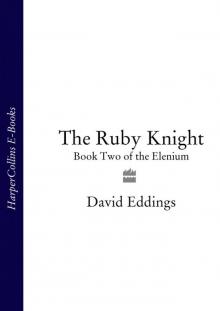 The Ruby Knight
The Ruby Knight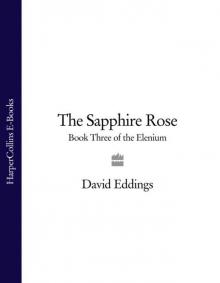 The Sapphire Rose
The Sapphire Rose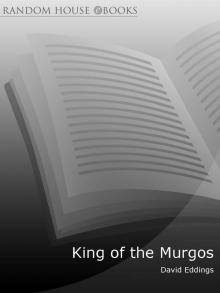 King of the Murgos
King of the Murgos The Seeress of Kell
The Seeress of Kell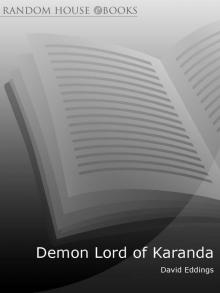 Demon Lord of Karanda
Demon Lord of Karanda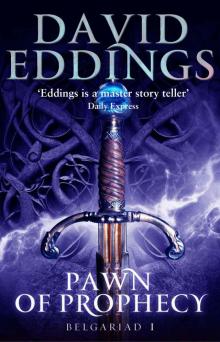 Pawn of Prophecy
Pawn of Prophecy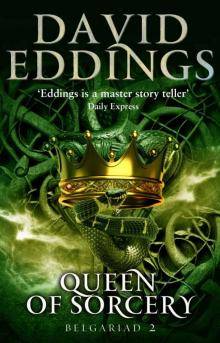 Queen of Sorcery
Queen of Sorcery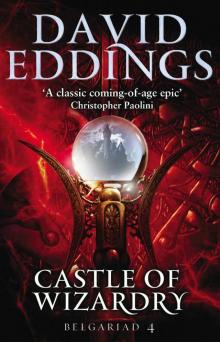 Castle of Wizardry
Castle of Wizardry Guardians of the West
Guardians of the West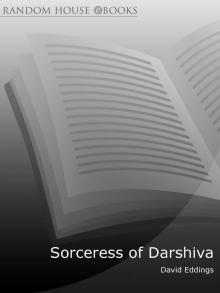 Sorceress of Darshiva
Sorceress of Darshiva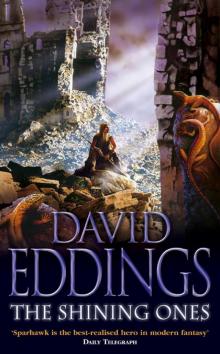 The Shining Ones
The Shining Ones Enchanters' End Game
Enchanters' End Game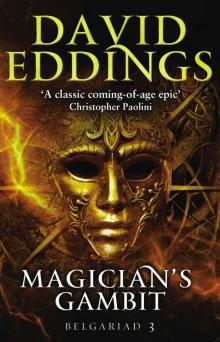 Magician's Gambit
Magician's Gambit High Hunt
High Hunt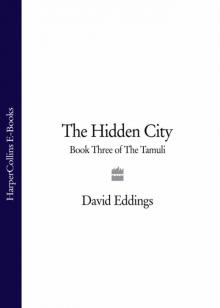 The Hidden City
The Hidden City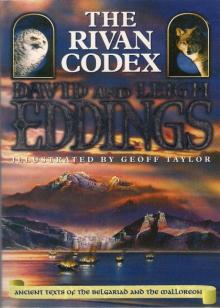 The Rivan Codex
The Rivan Codex Regina's Song
Regina's Song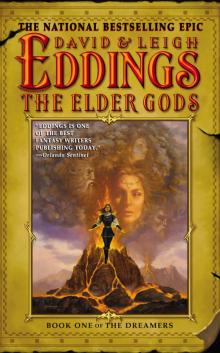 The Elder Gods
The Elder Gods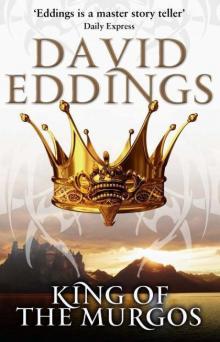 The Malloreon: Book 02 - King of the Murgos
The Malloreon: Book 02 - King of the Murgos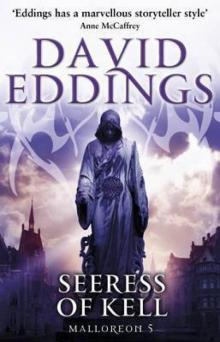 The Malloreon: Book 05 - Seeress of Kell
The Malloreon: Book 05 - Seeress of Kell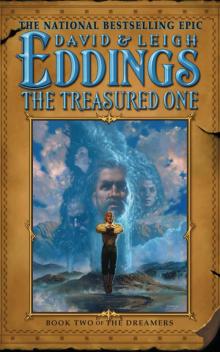 Treasured One
Treasured One The Malloreon: Book 04 - Sorceress of Darshiva
The Malloreon: Book 04 - Sorceress of Darshiva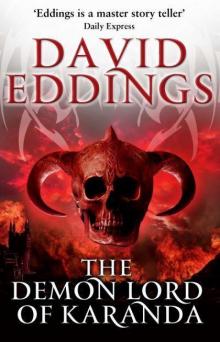 The Malloreon: Book 03 - Demon Lord Of Karanda
The Malloreon: Book 03 - Demon Lord Of Karanda Belgarath the Sorcerer and Polgara the Sorceress
Belgarath the Sorcerer and Polgara the Sorceress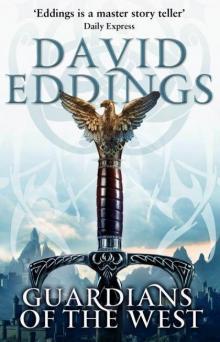 The Malloreon: Book 01 - Guardians of the West
The Malloreon: Book 01 - Guardians of the West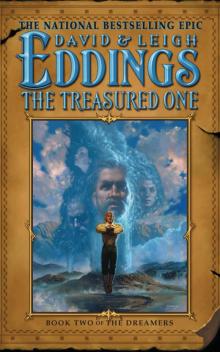 The Treasured One
The Treasured One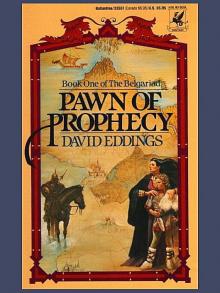 Pawn of Prophecy tb-1
Pawn of Prophecy tb-1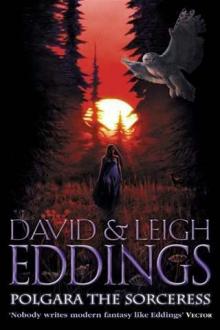 Polgara the Sorceress
Polgara the Sorceress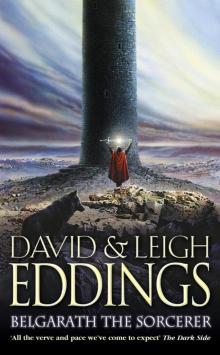 Belgarath the Sorcerer
Belgarath the Sorcerer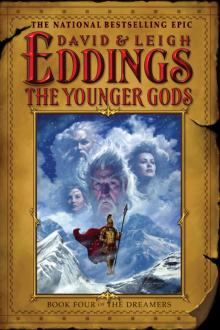 The Younger Gods
The Younger Gods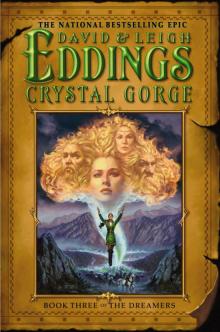 Crystal Gorge
Crystal Gorge